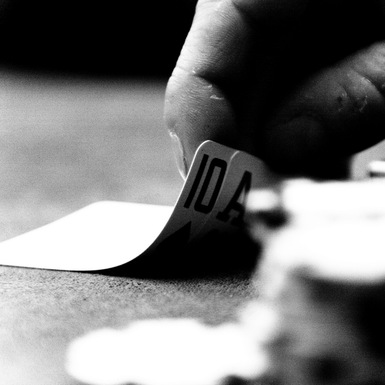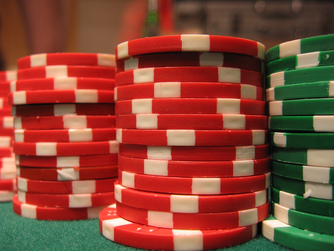Texas Hold'em Poker Can Teach You A Lot About Life!
Texas Hold'em is a game of patience and strategy. The ability to harness your environment and raise your senses will drive a shorter path to success. Carelessness, lack of a thought process and ignorance will surely show you how to get frustrated and end up broke.
From all the poker players I've met, the best all possess a few really intense characteristics. These traits combined contribute to really good Texas Hold'em players also being very smart, resourceful and unique people in other walks of life. If you have the opportunity to get philosophical with a Texas Hold'em pro, there are some lessons you can learn about your everyday affairs. Here are a few I've taken away: 1. Patience
If you're sitting at a Hold'em table with knees shaking, eyes shifting and flashing all other signs of disquietude to make your move, to raise the pot, then you're in for a heap of shit. It might not be this hand, but in the long run, your lack of discipline will bite you in the ass.
This goes for so many walks of life. For instance, parenting. Being a dad has taught me more patience than I ever thought I'd care to know. But I'm a better person for not gratifying my every need to be heard and obeyed. Making a two-year-old cry is really not gratifying at all. So if I exercise just a bit more patience in my interaction with my little girl, the rewards are huge (hearing a toddler laugh is better than getting high!). But I also think about the business world. I'm in sales. If I don't have patience (albeit passive aggressive when needed), I'll never get a deal close. Things never happen now and they rarely happen within my expected timeframe. One of the best qualities a salesperson can have is what I call "relentless patience". 2. How to Read People
Being able to look beyond the iris (proverbially, since too many people wear dumb sunglasses in hold'em games) is a partially adaptive and partially natural skill. The ability to out-think your opponent, however, will give you an edge in life. If you're not a natural at looking beyond skin deep to really get a tell on someone - whether in a business meeting, a social gathering or at the poker table - here's a couple signs you can lay back on. When you're able to see beyond a tangible situation, you attain a higher state of consciousness. If you're not a poker player, taking these observations to the table will help you squeeze some chips from opponents as well:
Make sure you're looking at more than one sign. Some signals are obvious, some much more subtle. A good poker player, much like a good businessman (especially in negotiation) can use some of these things to throw someone off. Keep on reading people, never halt - eventually there will be a tell! If you want to get really psychological about reading body language, check out this article from Business Balls. 3. You Don't Always Have To Play The Cards You're Dealt
Quick poker tip: when you sit at a table, try to pinpoint the worst player with the most chips (use your people reading skills). Sit directly to their left. Every time they bet, raise. It doesn't matter what your cards are. Do it.
Life is not always about looking at what you have in front of you and trying only to leverage that. For instance, I work for a marketing solutions company that has some very cool technologies. These technologies give us an edge over competitors - we have capabilities that others do not. But that doesn't mean I should ignore what my competitors are holding and just assume I can edge them out with my pocket aces - what if they are holding the hand that hits on the flop? Further to that - sometimes you don't know what competitors have behind closed doors! The most strategic of poker and hold'em players can actually beat people without ever looking at their own cards - they call this "playing it blind." At this level, the game becomes more about understanding what you're up against and using other signals to know whether you're beat or not. You're utilizing the community cards combined with your opponents actions and what you've learned about them over the past several hands or hours. You have to learn that you're sitting in an environment that's essentially a vacuum. When you're in this type of situation, you have to be resourceful - when you're more resourceful than your opponent, you'll win more. 4. How to be a Graceful Loser
The art of losing is something people rarely talk about. You hear speeches and read blogs about how to win and the traits of a great winner, etc.
But becoming a good loser takes some characteristics that, when looked at outside of the lost battle, actually make you a great winner. Here are four traits that will make you a more graceful loser (which of course translates to being the long-term winner): 1. Resilience - a great loser accepts his defeat, does not dwell on, picks themselves up and moves on. But not blindly - we move on with the gained knowledge of how to sharpen our swords in the future. 2. Humility - first, accept it. It's OK not to win. Then move on. But do it with honor. Humility will drive your future ability to identify with people in situations throughout life. Whether you have the upper or lower hand, your ability to empathize, understand and show compassion because you've 'been there before' will be a far greater tool than all the out and out victories you might compile at a poker table. One other piece of advice about humility that will make you a better person in life: when you lose, shake the winner's hand. You see it in poker, you see it in sports. MMA fighters go toe-to-toe in bare knuckle brutality, looking like wild lions in a bout for the only food available. But at the end of the fight, they pay each other the due respect, and that makes them both better. Heck, I've even seen politicians do it! 3. Reason - all true fighters do so with a purpose. Losing and understanding what it's like to lose can fuel the fire for your need to win. But at the same time, it's the opportunity to slow your role and move forward again with more caution and a refined strategy 4. Integrity - what's a man without dignity? Not a content one, I'm sure. I've often heard 'you have to hit a rock bottom to know when its time for change'. I don't believe that to be so true. What I do believe is that when things go sour to any extent (dependent on the level that affects you), if you're able to recognize and reverse those notions, you're going to raise your own integrity. It generally takes some kind of defeat to suffer those feelings, but they make you stronger. 5. Setting Feasible Goals
When you sit down at a Texas Hold'em table, you better have a plan. It's a lot like going to the gym. If you haven't got the right routine, you're just wasting time. But with poker, you're gambling your money - and your time. Who wants to waste either?
Setting goals in both poker and life will put you on a more clear and defined path toward success - providing, of course, you're being realistic. That's where there's a great lesson - being able to set feasible goals. If you have ever lost before, then setting more attainable goals might help you straighten out your priorities and do a little better next time. When setting goals, make sure you are definitively specific. Give yourself a time frame and a step-by-step way to attain certain milestones within that time. Its almost a quantitative science, you have to be precise and measured with your actions. The more you adhere to this, the easier it will get. 6. The Benefit of Short-Term Amnesia
As a poker player, you can't let the past dictate your future. Of course at a poker table, 'the past' can refer to anything from your first hand ever to the hand you just played 5 minutes ago. Either way, here's the deal. Just because you were dealt pocket kings, doesn't mean you won't get them again next hand. It also doesn't mean the guy across the table doesn't have pocket aces. It also doesn't mean that the guy who bellied up with a 4-6 off suit won't hit 3-5-7 on the flop. But just because any of these scenarios and then some can play out in any hand, it doesn't mean you should use that 'chance' to dictate your strategy going forward.
So how is this a life lesson versus a poker lesson? Well perhaps think about it in terms of a relationship. Each hand you're dealt at the table is like getting into a relationship. Generally when you're in a good one, you tend to think 'this is it' - but they don't all work out. The key in life is to learn and have the strength to move on; but more importantly its to know why you didn't win. Did you miss the signs being thrown off by someone else? Either way, you have to learn from the past, but not let it slow you down or deter a healthy path. If you wallow in festering self-pity of a lost love (or the last lost hand), you're more easily distracted and less likely to succeed in your future relationships (or hands!).
1 Comment
|

